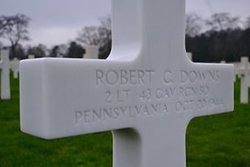Robert Downs was born on November 27, 1911 and was from Harrisburg, Pennsylvania. He was KIA in France while serving with the 43rd Cavalry Squadron, 3rd Cavalry Group. His sacrifice is remembered on a plaque in Malling, France.
AWARDED FOR ACTIONS
DURING World War II
Service: Army
Battalion: 43d Cavalry Reconnaissance Squadron
GENERAL ORDERS:
Headquarters, Third U.S. Army, General Orders No. 98 (1944)
CITATION:
The President of the United States of America, authorized by Act of Congress July 9, 1918, takes pride in presenting the Distinguished Service Cross (Posthumously) to Second Lieutenant (Cavalry) Robert C. Downs (ASN: 0-1032752), United States Army, for extraordinary heroism in connection with military operations against an armed enemy while serving with the 43d Cavalry Reconnaissance Squadron, in action against enemy forces on 14 October 1944 in Germany. Shortly after Lieutenant Downs' unit occupied strategic positions, plans were made to send night patrols across the river to determine enemy strength and disposition. After a careful study of the river, this officer concluded that the river bank was held in force only during the hours of darkness. Lieutenant Downs requested permission to take a small daylight patrol across the river, basing his request on his belief that the bulk of the German force withdrew to high ground about 1,200 yards back from the river and maintained only scattered sentries on the exposed forward slope during daylight hours. Lieutenant Downs organized a patrol consisting of himself and another man, and covered by fire by other members of his platoon, Lieutenant Downs was able to reach the opposite shore unmolested only because of the audacity and unexpectedness of the crossing and the off guard and lax German forces. After landing, he carried out his patrol mission among the hostile enemy, noting their extent and location. While engaged in this reconnaissance, the patrol encountered a German force of undetermined strength and killed or wounded one enemy soldier. In the ensuing fight, the other member of the patrol was stunned or wound by an enemy grenade and he was able to extricate himself. Lieutenant Downs returned alone to the river bank utilizing a German trench for that purpose. Upon reaching the river bank, he found his rubber boat damaged by a snag and in a sinking condition. After calling to his covering force to protect his crossing, he swam the river, returning with his full equipment. His report gave valuable information on enemy positions and strength and of particular importance, the methods of defense employed by the enemy during the daylight hours. This voluntary daylight crossing of the river in the face of a strong enemy force to what seemed like certain death or capture, is in keeping with the highest traditions of the military service. Second Lieutenant Downs' intrepid actions, personal bravery and zealous devotion to duty at the cost of his life, exemplify the highest traditions of the military forces of the United States and reflect great credit upon himself, his unit, and the United States Army.

PRIVATE CITIZENS SUPPORTING AMERICA'S HERITAGE
American
War Memorials Overseas, Inc.
War Memorials Overseas, Inc.
Downs Robert C
Name:
Robert C Downs
Rank:
Second Lieutenant
Serial Number:
1032752
Unit:
43rd Cavalry Reconnaissance Squadron (MECHZ)
Date of Death:
1944-10-22
State:
Pennsylvania
Cemetery:
Lorraine American Cemetery and Memorial, Saint-Avold, France
Plot:
C
Row:
27
Grave:
63
Decoration:
Distinguished Service Cross
Comments:
